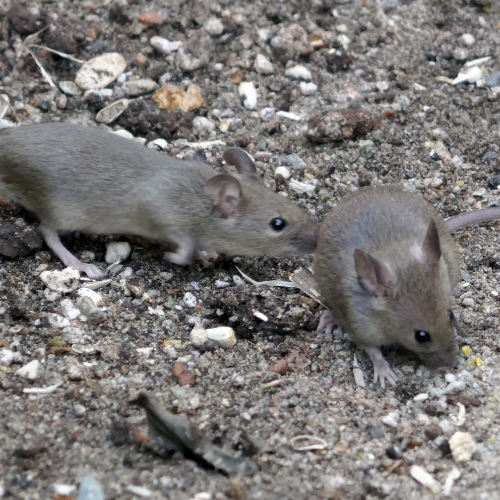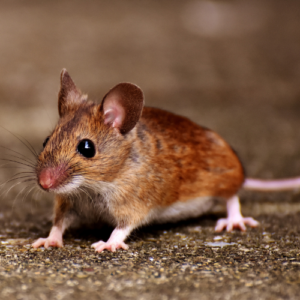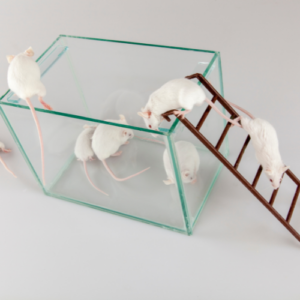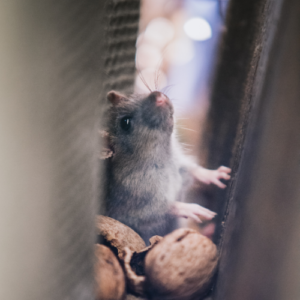
12 Jul Preventing Mouse Infestations
Managing Mice Infestations
Mice infestations can cause significant problems for homeowners and business owners in South Florida. These tiny invaders can damage property, contaminate food, and spread diseases. Understanding how to control and prevent mice is crucial for maintaining a healthy and safe environment. At Pest Busterzz, we are committed to helping you tackle these pesky problems effectively and sustainably.
In South Florida, the most common types of mice you may encounter are house mice and deer mice. House mice are small, light brown to gray rodents with large ears and a long, hairless tail. They are known for their ability to adapt to human environments and can be found in homes, businesses, and agricultural areas. Deer mice, on the other hand, have a two-tone color pattern with white underbellies and feet, and are more commonly found in rural and semi-rural areas.
Detecting a mouse infestation early is key to preventing extensive damage. Common signs include droppings, gnaw marks, scratching noises, and nests made from shredded materials. You might find droppings in your kitchen cabinets, pantry, or along baseboards. Gnaw marks can appear on food packaging, furniture, and wires. Scratching noises, particularly at night, often indicate mice are present in walls or ceilings. Nests are typically hidden in secluded areas like attics, basements, or behind appliances.
Mice pose several health risks. They can transmit diseases such as Hantavirus, Salmonella, and Leptospirosis through their droppings, urine, and saliva. Additionally, mice can introduce allergens into your home, triggering allergic reactions and asthma, particularly in children. Contamination of food and surfaces by mice can lead to foodborne illnesses. Maintaining a clean and mouse-free environment is essential for your family’s health.
Preventing Mice Entry
Preventing mice from entering your home is the first step in controlling infestations. Inspect your home for any cracks, gaps, or holes that mice could use to enter. Common entry points include gaps around doors and windows, holes in walls, and openings around utility lines. Use caulk, steel wool, or other appropriate materials to seal these entry points. Installing weather stripping and door sweeps can also help keep mice out.
Mice are attracted to food sources, so proper food storage is crucial. Keep all food, including pet food, in airtight containers. Regularly clean kitchen counters, floors, and dining areas to remove crumbs and spills. Dispose of garbage regularly and use bins with tight-fitting lids. Ensuring that food is not easily accessible will make your home less attractive to mice.
Clutter provides hiding spots for mice, so keeping your home organized can help prevent infestations. Regularly declutter storage areas such as basements, attics, and garages. Store items in plastic bins with lids instead of cardboard boxes, which mice can easily chew through. Keeping storage areas clean and organized reduces the places where mice can nest.
Maintaining the exterior of your home is equally important in preventing mice infestations. Keep your lawn trimmed and remove any debris or clutter from around your property. Store firewood at least 20 feet away from your home and five feet off the ground. Trim tree branches and shrubs that touch your home to prevent mice from using them as pathways. Regularly inspect and clean gutters to ensure they are not providing shelter for mice.
Repel Mice Naturally
Using natural repellents can help deter mice from entering your home. Peppermint oil is a popular choice, as mice find its strong scent unpleasant. Soak cotton balls in peppermint oil and place them in areas where mice are likely to enter, such as near doors, windows, and vents. Other natural repellents include cloves and bay leaves. These can be placed in cabinets, pantries, and other areas where mice are a concern.
Homemade traps can be an effective way to catch and remove mice. Bucket traps, for example, use a baited platform to lure mice into a bucket they cannot escape from. Snap traps, which are more traditional, can also be effective when baited with peanut butter or cheese. Place traps along walls and in areas where you have seen signs of mice activity. Regularly check and empty the traps to ensure they remain effective.
Ultrasonic devices emit high-frequency sound waves that are supposed to deter mice. These devices are easy to use and can be placed in various rooms around your home. However, the effectiveness of ultrasonic devices can vary, and they may not be a standalone solution for severe infestations. Combining ultrasonic devices with other control methods can improve their effectiveness.
Professional Mouse Control Solutions
While DIY methods can be effective, there are times when professional help is necessary. Signs that indicate the need for professional pest control services include large numbers of mice, repeated infestations, and evidence of significant property damage. Professional pest control services offer expertise and advanced tools that can effectively address severe infestations and prevent future problems.
At Pest Busterzz, we provide comprehensive pest control services tailored to the needs of South Florida residents and businesses. Our approach includes thorough inspections and assessments to identify the extent of infestations. We develop customized pest management plans that address specific needs, using eco-friendly and effective treatments. Our services include pest monitoring, biological control introductions, habitat management, and the application of environmentally safe pesticides. We are committed to promoting long-term health and productivity through sustainable practices.
Long-Term Pest Control
Integrated Pest Management (IPM) is a comprehensive approach that combines multiple control methods to manage pest populations effectively. IPM emphasizes prevention, monitoring, and control, minimizing the use of chemical pesticides. By implementing IPM, homeowners and business owners can achieve long-term pest control while promoting a healthier environment. Key components of IPM include regular inspections, preventive measures, and the use of natural and mechanical control methods.
Regular inspections and maintenance are crucial for long-term mouse control. Schedule routine inspections of your home or business to identify and address potential entry points and signs of infestations. Keep up with repairs and maintenance to ensure that your property remains secure and less attractive to mice. Regular cleaning and decluttering can also help prevent mice from finding shelter and food.
Community involvement is essential for effective mouse control, especially in multi-unit buildings and business complexes. Educate your neighbors about the importance of mouse control and encourage them to implement preventive measures. Coordinating efforts with your community can help reduce the overall mouse population and prevent infestations. Working together creates a healthier and safer environment for everyone.
Conclusion
Effective mouse control requires a combination of preventive measures, DIY methods, and professional pest control services. By understanding the signs of infestations and taking proactive steps, homeowners and business owners in South Florida can keep their properties mouse-free. Regular inspections, proper food storage, and eliminating clutter are essential for preventing infestations. When infestations do occur, professional services like Pest Busterzz can provide the expertise and customized solutions needed for effective control.
At Pest Busterzz, we are dedicated to helping you maintain a healthy and pest-free environment. Our comprehensive pest control services ensure that your home or business remains protected from mice and other pests. Contact us today to schedule an inspection or consultation and take the first step towards a mouse-free property. Together, we can create a safer and healthier environment for all South Florida residents and businesses.







No Comments